DEPARTMENT OF CELL PHYSIOLOGY
All of the cell functions are performed or supported by operation of channels (ion and water channels) and transporters (carriers and pumps) located on the membrane. The objectives of our division work are to elucidate molecular mechanisms of most general cell activities, such as volume regulation, absorption/secretion and environmental signal reception, to clarify roles of channels, transporters and receptors in these fundamental functions from the viewpoint of integrative biology, and to throw the light on the relationship between these malfunctions and diseases or cell death, as well as to study the multifunctionality of channel and transporter during cell functions or malfunctions.
The main subjects of our current research are as follows:
(1) "Molecular mechanisms of cell volume regulation and their physiological roles": Most cells regulate their cell volume even under anisotonic conditions. In the volume regulation mechanisms, a number of channels, transporters and receptors are involved (Fig. 1).
We are investigating to identify volume-regulatory membrane machineries, including the volume-sensitive anion channel, and to clarify their physiological roles.
(2) "Induction mechanisms of apoptotic, necrotic and ischemic cell death": Dysfunction of cell volume regulation is associated with necrotic and apoptotic cell death (Fig. 2) which is coupled to persistent swelling (necrotic volume increase: NVI) and shrinkage (apoptotic volume decrease: AVD). Our aim is to pioneer the new field of ‘PHYSIOLOGY OF CELL DEATH’ through elucidation of the mechanisms of cell volume regulation and their dysfunction. We are attempting to focus our studies on the mechanisms of ischemic cell death of brain neurons and cardiac myocytes.
(3) "Molecular mechanisms of biosensor channel functions": Channels are multifunctional proteins involved not only in electric signal generation and ion transport but also in sensing the environmental factors or stress. We aim at elucidating molecular mechanisms of volume- and stress-sensing functions of anion and ATP channels (Fig. 3).
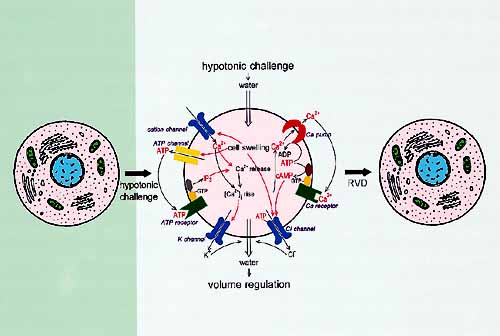
Fig. 1 Molecular mechanisms of the regulatory volume decrease (RVD) and of volume-sensor Cl channel (VSOR) activation. [after Okada et al. 2001, J. Physiol. 532, 3-16]
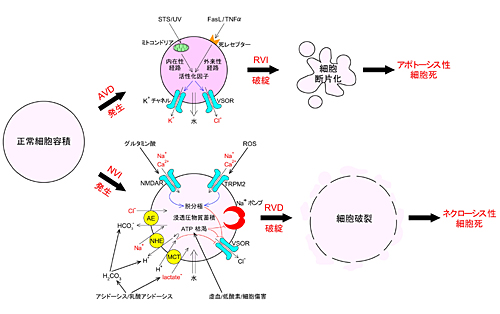
Fig. 2 Roles of channels and transporters in the induction of apoptotic volume decrease (AVD) and apoptotic cell death as well as in that of necrotic volume increase (NVI) and necrotic cell death. [after Okada et al. 2004, Pflügers Arch. 448, 287-295]
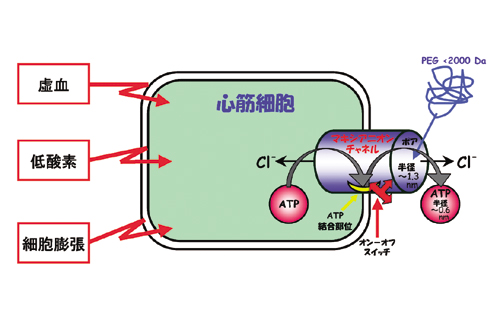
Fig. 3 Stress-sensing, ATP-releasing maxi-anion channel in cardiomyocytes.
[after Sabirov & Okada 2005, Purinergic Signalling. 1, 311-328]
Staff
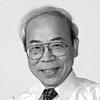 |
Professor:
OKADA, Yasunobu, MD, PhD
1970 Graduated from Kyoto University, Faculty of Medicine. 1974 Instructor and 1981 Assistant Professor, Kyoto University, Faculty of Medicine. 1992 Professor, NIPS.
Speciality: Molecular and Cellular Physiology |
 |
Assistant Professor:
KASHIHARA, Yasuhiro, PhD
1976 Graduated from Toyama University, Faculty of Science. 1983 Completed the doctoral course in Science, Kyushu University. 1983 Research Associate, NIPS.
Speciality: Neurobiology |
 |
Assistant Professor:
SHIMIZU, Takahiro, PhD
1995 Graduated from Toyama Medical and Pharmaceutical University, Faculty of Pharmaceutical Sciences. 2000 Completed the doctoral course in Life Science, the Graduate University for Advanced Studies. 2000 Research Fellow, NIPS. Apr 2002 JSPS Postdoctoral Fellow. Jul 2002 Research Associate, NIPS.
Speciality: Cell Physiology |
 |
Assistant Professor:
TAKAHASHI, Nobuyuki, PhD
1993 Graduated from Kyoto University, Faculty of Agriculture. 1999 Completed the doctoral course in Medicine, Kyoto University. Apr 1999 AIST Research Fellow. Oct 1999 BRAIN Research Fellow. Dec 2002 Research Associate, NIPS.
Speciality: Cell Biology |
 |
Research Associate:
INOUE, Hana, PhD
1997 Graduated from Waseda University, Faculty of Education. 1999 Completed the master course in Science and Engineering, Waseda University. 2003 Completed the doctoral course in Life Science, the Graduate University for Advanced Studies. 2003 JST Research Fellow. Oct 2004 Research Fellow, NIPS.
Speciality: Cell Physiology |
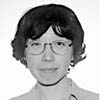 |
Postdoctoral Fellow:
URAMOTO, Hiromi
1990 Graduated from Japan women's University, Department of Food and Nutrition. 2002 Left the doctoral course in Life Science, the Graduate University for Advanced Studies. Nov 2002 JST Research Fellow. Apr 2004 MEXT Postdoctoral Fellow.
Speciality: Cell Physiology |
 |
Postdoctoral Fellow:
LEE, Elbert, PhD
1997 Graduated from Northwestern University, College of Arts and Sciences. 2005 Completed the doctoral course in Life Science, the Graduate University for Advanced Studies.
Specialty: Cell Physiology |
 |
Postdoctoral Fellow:
NUMATA, Tomohiro, PhD
2001 Graduated from Tokyo Gakugei University, Faculty of Education. 2003 Completed the master course in Education, Tokyo Gakugei University. 2005 Completed the doctoral course in Life Science, the Graduate University for Advanced Studies.
Specialty: Cell Physiology |
 |
Postdoctoral Fellow:
LIU, Hongtao, PhD
1992 Graduated from China medical University, Faculty of medicine. 2005 Completed the doctoral course in Life Science, the Graduate University for Advanced Studies.
Specialty: Cell Physiology |
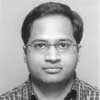 |
Postdoctoral Fellow:
MANDADI, Sravan, PhD
1995 Graduated from Berhampur University, Faculty Pharmacy (India). 2004 Graduated from University of Sydney, Faculty of Pharmacy (Australia). 2005 JSPS Postdoctoral Fellow.
Specialty: Neurophysiology |
|












